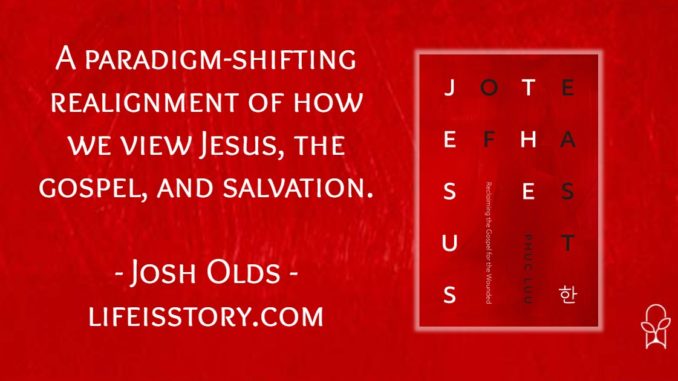
Published by Herald Press on June 16, 2020
Genres: Non-Fiction, Christian Life
Buy on Amazon
Goodreads

Why does our theology of salvation focus on forgiving sinners, but not on healing those wounded by sin?
Much of Western Christianity has subdued the narrative of Jesus as a Palestinian Jewish healer and liberator who served the sick and oppressed. But the Jesus of the Gospels is a revolutionary who stands with the sinned against, the wounded, and the marginalized. In Jesus of the East, author Phuc Luu re-narrates the life of Jesus to show how he made it his work to topple systems that privileged the few and disregarded the many, especially the poor and lowest.
In this provocative book, Luu offers a counter-narrative to Western Christianity, which for centuries has legitimized colonization and violence to prop up the powerful at the expense of the masses. Pulling from the tradition of the early Eastern church, the present work of theologians of the oppressed, and Luu’s own experiences as a Vietnamese immigrant, Jesus of the East offers a transformative vision of healing for the world.
For those living in the land between pain and hope, Luu’s prophetic words will renew our imaginations and draw us closer to the heart of God.
For many in the Western church, Jesus is a Western construct. We don’t always realize it, because it’s been the case since virtually the Romanization of Christianity with Constantine and evolved as the Europeanization of Christianity became the Americanization of Christianity as time moved forward. Almost altogether lost was the brown-skinned, Palestinian liberator who stood as a counter to oppressive systems and whose salvation held massive implications for the present world. Jesus of the East, written by Phuc Luu, is a paradigm-shifting realignment of how we view Jesus, the gospel, and salvation. It’s challenging, insightful, and liberating. It’s bound to make some people uncomfortable (for who wants to be told that their theology is wrong?), but for many Luu’s words will be a healing balm that sheds new but actually ancient light on the person of Christ.
Jesus of the East balances this eastern perspective of Jesus with a manifesto of the harm that the western perspective has done and how it has been weaponized against ethnic, sexual, and religious minorities. In talking about the enfleshment of Christ and the importance of the body in Christianity, Luu raises the issues of police violence, Native American relocation, warfare, and more. He cogently and effectively shows how Western Christianity’s focus on the afterlife has excused any number of evils in this life.
Luu rightly reframes Jesus’s ministry as one in which he enters into the lives of the wounded and suffering. Using the Korean concept of han—a deep woundedness of unresolved victimization that results anger, hatred, and violence—to explain the cycle of suffering that Jesus came to end. Luu draws on Korean history to bring nuance to the term, uses examples from Korean theologian Andrew Sung Park to illuminate the term biblically, then applies it in particular to racial issues in the United States. The result is a call to image Jesus, to reenvision the Kingdom, and bring about healing.
The Kingdom that Jesus of the East calls its readers toward is one intrinsically focused not on the next world, but this one. Not one praying to God to get them out of this existence, but to be used through this existence to redeem it. It moves faith from the personal to the communal, encouraging readers to see how it calls us to stand against oppression, tear down unjust systems, and bring peace and justice to the downtrodden.
Through it all, Luu shares his story, ending each chapter with a personal vignette that ties to the chapter’s theme. I thought these could have been better integrated into the story, but they do show Luu’s personal connection to the topic and helps readers understand the personal zealousness that runs through the work.
Jesus of the East is an exceptional work. It’s worth wrestling with and seriously considering. Luu asks readers to reconsider the dominant strain of theology that they’ve been taught is the only one and, while doing so may be uncomfortable, breaking those chains of oppression is so liberating. This is a gospel that truly is good news and Luu preaches it with zeal and confidence.
